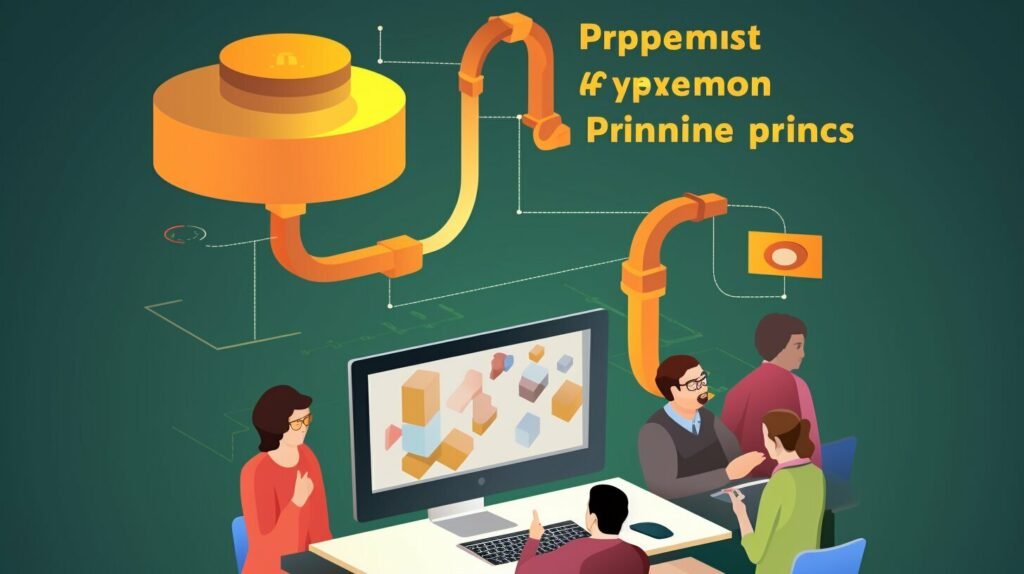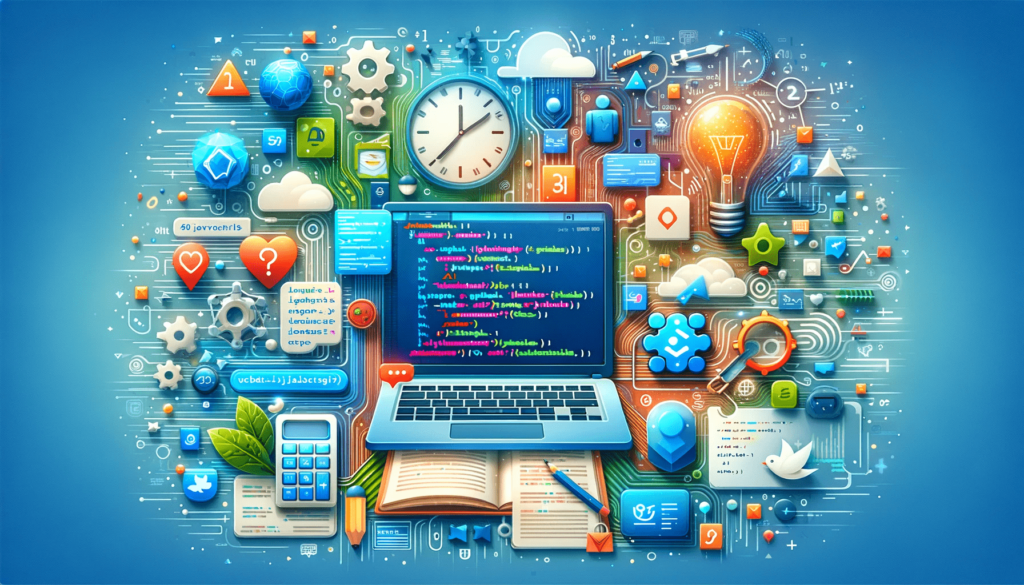Python programming is a powerful skill that can open up new opportunities for beginners looking to enhance their digital literacy. Whether you’re interested in web development, data analysis, or artificial intelligence, Python is a versatile language that can help you achieve your goals. In this section, we will delve into the fundamentals of Python programming and explore how beginners can unlock their digital potential through coding. We will introduce key concepts, resources, and tools that will help beginners embark on their Python programming journey.
Key Takeaways:
- Python programming is a valuable skill for beginners to enhance their digital literacy.
- Comprehensive resources, such as books and courses, are available for learning Python fundamentals.
- Interactive learning, collaboration, and project-building are essential for mastering Python programming.
- Personalized learning platforms, like Dropout Developer, offer valuable resources for beginners.
- By mastering Python programming, beginners can unlock their digital potential and explore endless possibilities.
Comprehensive Resources for Learning Python Fundamentals
To gain a solid understanding of Python programming, beginners can explore comprehensive resources such as books and courses that cover the essential concepts and syntax. One highly recommended book is “Python Programming for Beginners” by John Smith. This book covers everything from the basics of Python syntax to more advanced topics like object-oriented programming and using popular libraries. It includes real-world projects, step-by-step exercises, and practical tips for writing clean and efficient code.
If you prefer a more interactive approach to learning, the course “Python Fundamentals: From Zero to Hero” offered by XYZ Academy might be a great option. This course takes beginners through the fundamentals of Python programming, starting with variables, data types, and operators. It then progresses to control structures, loops, and functions, all while emphasizing hands-on coding and collaboration.
Table 1: Comparison of Python Programming Resources
| Resource | Content | Features |
|---|---|---|
| “Python Programming for Beginners” book | Covers Python syntax, data structures, control structures, functions, and more | Real-world projects, step-by-step exercises, tips for clean code |
| “Python Fundamentals: From Zero to Hero” course | Introduction to Python programming concepts and syntax | Interactive learning, collaboration, hands-on coding |
Whichever resource beginners choose, it is essential to practice what they learn by building projects. Starting with small exercises and gradually moving on to larger projects helps develop problem-solving skills and boosts confidence in using Python. Projects provide a practical way to apply knowledge, reinforce concepts, and gain experience in real-world scenarios. By combining comprehensive resources, interactive learning, and project-building, beginners can unlock the fundamentals of Python programming and set themselves up for success in their coding journey.
Interactive Learning and Collaboration in Python Programming
Interactive learning and collaboration play a crucial role in mastering Python programming, allowing beginners to actively engage with the language and build their skills. To facilitate this process, there are several valuable resources available that emphasize hands-on experiences and collaboration.
One particularly comprehensive resource is the book “Python Programming for Beginners,” which covers essential Python programming topics such as syntax, data structures, control structures, and functions. It also goes beyond the basics, exploring advanced concepts like object-oriented programming, error handling, and popular libraries. The book provides step-by-step exercises and real-world projects, allowing beginners to apply their knowledge to practical scenarios and write clean, efficient code.
Another valuable resource for beginners is the “Python Fundamentals” course offered by a popular online learning platform. This course introduces the foundational concepts of Python programming, including variables, data types, operators, control structures, and loops. The emphasis is on interactive learning, with coding exercises and practical examples to reinforce understanding. Additionally, the course encourages collaboration through group projects and discussions, enabling beginners to learn from their peers and solidify their understanding of Python programming fundamentals.
Building projects is an essential part of the learning process for beginners. Starting with small exercises and gradually moving on to larger projects provides an opportunity to apply Python programming concepts and develop problem-solving skills. By building projects in Python, beginners can gain confidence in their abilities and learn how to tackle real-world challenges. This practical approach allows for a deeper understanding of the language and fosters creativity and innovation.
| Resource | Description |
|---|---|
| “Python Programming for Beginners” book | A comprehensive guide covering Python fundamentals, advanced topics, and real-world projects. |
| “Python Fundamentals” course | An interactive online course introducing Python programming concepts and encouraging collaboration. |
In conclusion, interactive learning and collaboration provide beginners with the necessary tools and support to master Python programming. By utilizing resources such as comprehensive books and interactive courses, beginners can gain a solid foundation in Python fundamentals. Building projects further enhances their skills and problem-solving abilities, preparing them for real-world scenarios. Embracing interactive learning and collaboration allows beginners to actively engage with Python programming, unlocking their digital potential and paving the way for endless possibilities.
Building Projects to Develop Problem-Solving Skills
Building projects in Python programming is a pivotal step for beginners to solidify their understanding of the language and cultivate problem-solving abilities. By applying the concepts and techniques they have learned, beginners can enhance their skills and gain confidence in using Python to tackle real-world challenges.
One effective approach to building projects is to start small and gradually work on more complex tasks. This allows beginners to gradually expand their knowledge and apply their skills in a practical manner. For example, beginners can begin by creating simple programs that perform basic calculations or manipulate strings. As they progress, they can move on to developing more intricate projects such as building web applications, data analysis programs, or even games.
To facilitate the process of building projects, beginners can refer to online resources, forums, and communities that provide step-by-step tutorials, code examples, and guidance. These resources can serve as valuable references and sources of inspiration, helping beginners overcome challenges and learn from experienced developers.
Furthermore, collaborating with peers who are also learning Python can greatly enhance the project-building experience. By working together, beginners can share ideas, troubleshoot issues, and learn from each other’s approaches. This collaborative environment creates an opportunity for beginners to receive feedback, improve their coding skills, and gain a deeper understanding of Python fundamentals.
Example Table: Project Ideas
| Project | Description |
|---|---|
| Task Manager | Create a program that allows users to manage their tasks, set reminders, and track progress. |
| Weather App | Develop a weather application that retrieves real-time weather data for a specified location. |
| Inventory Tracker | Build a program that helps users manage their inventory, track stock levels, and generate reports. |
In conclusion, building projects is an essential part of learning Python programming. Through hands-on experience, beginners can reinforce their understanding of Python fundamentals, enhance problem-solving skills, and gain confidence in their abilities. With a plethora of resources and the support of a collaborative community, beginners can embark on a journey of continuous improvement and unlock the endless possibilities offered by Python programming.
Personalized Learning at Dropout Developer
At Dropout Developer, beginners can access personalized learning resources and explore the fundamentals of Python programming at their own pace. We offer a variety of resources, including courses, books, and an interactive learning app, to cater to different learning styles and preferences.
One of our featured resources is the book “Python Programming Fundamentals,” which covers essential topics such as Python syntax, data structures, control structures, and functions. It also dives into more advanced concepts like object-oriented programming, error handling, and popular libraries. With real-world projects, step-by-step exercises, and tips for writing clean code, this book provides a comprehensive learning experience for beginners.
In addition to the book, we offer a course titled “Introduction to Python Programming.” This course is designed to introduce beginners to Python fundamentals, including variables, data types, operators, control structures, and loops. Through interactive learning activities, such as coding exercises, note-taking, and using the Python shell, learners can enhance their understanding of Python syntax and gain hands-on experience.
At Dropout Developer, we understand the importance of collaboration in the learning process. That’s why we encourage beginners to work with peers who are also learning Python. By teaching concepts to others, learners can solidify their understanding and discover new approaches to problem-solving. Our community forum provides a platform for learners to connect, share ideas, and seek assistance from fellow Python enthusiasts.
| Benefits of Personalized Learning at Dropout Developer |
|---|
| Flexible learning options |
| Comprehensive resources with real-world examples |
| Interactive learning activities |
| Opportunity for collaboration with peers |
| Access to a supportive community forum |
Conclusion
By taking advantage of the personalized learning resources at Dropout Developer, beginners can confidently navigate the fundamentals of Python programming. Whether through the comprehensive book, interactive courses, or collaborative community, learners have the tools they need to unlock their coding potential. Start your Python programming journey today and discover the endless possibilities that await.
Conclusion
Mastering the fundamentals of Python programming opens up a world of opportunities for beginners, equipping them with the skills to navigate the digital landscape with confidence. To unlock these fundamentals, there are several resources available.
One comprehensive book covers essential topics such as Python syntax, data structures, control structures, and functions. It goes beyond the basics and explores advanced concepts like object-oriented programming, error handling, and popular libraries. The book also offers real-world projects, step-by-step exercises, and valuable tips for writing clean code.
Another valuable resource is a course that introduces Python programming concepts in a structured manner. From variables and data types to operators, control structures, and loops, the course provides a strong foundation. It encourages interactive learning through hands-on coding, note-taking, and using the Python shell. Collaborating with peers who are also learning Python is actively encouraged to reinforce understanding and knowledge.
Building projects is an essential part of learning Python programming. Beginners can start with small exercises and gradually tackle larger projects. This process helps to develop problem-solving skills and build confidence in using Python. By applying their knowledge to real-world scenarios, beginners can solidify their understanding and become proficient in Python programming.
By taking advantage of comprehensive resources, interactive learning experiences, and project-building opportunities, beginners can unlock their digital potential through Python programming. Whether it’s for personal development or pursuing a career in the tech industry, mastering the fundamentals of Python opens up a world of opportunities.
FAQ
What topics does the book on Python programming cover?
The book covers comprehensive chapters on Python fundamentals, data structures, control structures, functions, object-oriented programming, error handling, and popular libraries.
What does the Python course emphasize?
The Python course emphasizes interactive learning through coding, note-taking, and using the Python shell. It also encourages collaboration with peers who are learning Python and teaching concepts to solidify understanding.
Why is building projects important in learning Python?
Building projects helps develop problem-solving skills and gain confidence in using Python. Beginners can start with small exercises and gradually tackle larger projects to apply their knowledge in real-world scenarios.







